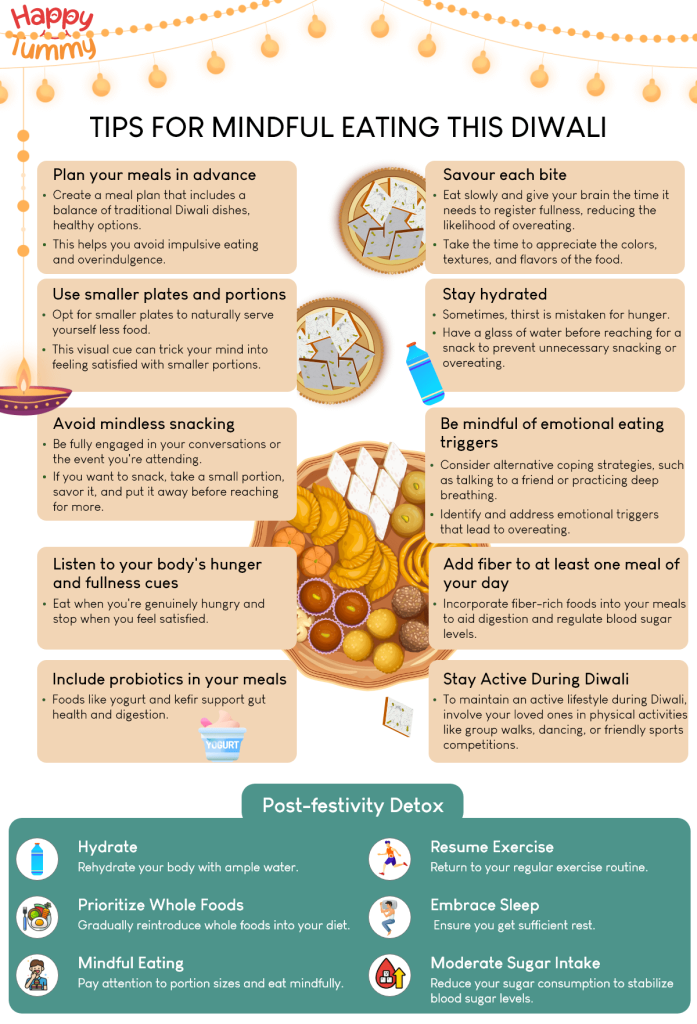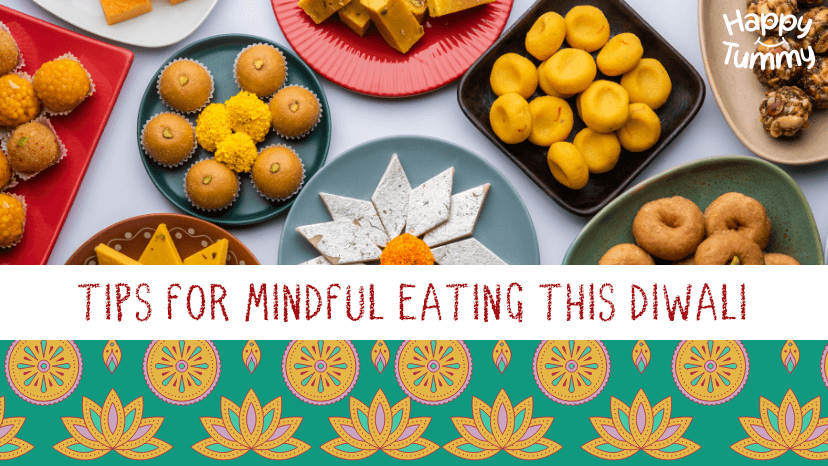Table of Contents
Provide tips and strategies for maintaining a balanced diet during the festive season, emphasizing portion control and mindful eating.
Diwali, the Festival of Lights, is a time of joy, togetherness, and celebration. It’s a time when families come together, homes are adorned with lamps and rangoli, and the air is filled with the aromas of delicious, homemade dishes.
Food plays a central role in Diwali celebrations, where traditional sweets, savoury snacks, and rich, indulgent meals take center stage. However, amidst all the festivities and feasting, it’s crucial to remember the importance of mindful eating.
Let’s explore some practical tips to strike a balance between indulgence and well-being.
What is mindful eating–its importance during the festive season

Mindful eating is a practice that involves being fully present and aware of what and how you eat. Its benefits extend beyond the dinner table. It helps you foster a healthier relationship with food, reduce overindulgence, and even contribute to overall well-being.
Diwali, with its culinary delights and festive treats, can sometimes lead to overindulgence and post-celebration guilt.
Mindful eating can be your ally during this time, allowing you to savor the delicious dishes without the burden of guilt.
By staying mindful of your food choices and portions, you can enjoy the celebration to the fullest while keeping your well-being in check.
Tips for Mindful Eating During Diwali
1. Plan your meals in advance
Planning your meals in advance means setting a framework for what and how much you’ll eat during Diwali. This helps you avoid impulsive eating and overindulgence. Consider creating a schedule for your meals and snacks, including the traditional Diwali treats you want to enjoy.
By having a plan in place, you’re less likely to succumb to the temptation of constantly snacking on high-calorie items. This doesn’t mean you can’t enjoy your favorite dishes; it means you’re making conscious choices about when and how much you’ll consume.
How to do it?
Before Diwali, create a meal plan that includes a balance of traditional Diwali dishes, healthy options, and the occasional indulgence. For instance, plan to enjoy a serving of homemade sweets during the afternoon while keeping your breakfast and dinner light and nutritious.
2. Savour each bite
“Chew slowly, relish every bite, and be grateful for the food on your plate – recipe for a healthy life”, says nutrition and wellness expert, Rujuta Diwekar.
Savouring each bite involves being fully present in the moment while you eat. Take the time to appreciate the colors, textures, and flavors of the food. Chew your food slowly and deliberately, allowing your taste buds to relish every nuance. This practice not only enhances your enjoyment of the meal but also helps you recognize when you’re satisfied. Eating slowly gives your brain the time it needs to register fullness, reducing the likelihood of overeating.
How to do it?
When you’re about to enjoy a piece of Diwali mithai , take a moment to appreciate its appearance and aroma. As you bite into it, notice the sweetness, texture, and the way it melts in your mouth. By savouring each bite, you’ll find that you can be satisfied with a smaller portion.
3. Use smaller plates and portions
Using smaller plates and portion control is a practical way to manage your food intake without feeling deprived. When you opt for smaller plates, you naturally serve yourself less food. This visual cue can trick your mind into feeling satisfied with smaller portions. If you still desire more, you can always go back for seconds, but this strategy encourages you to be more mindful of your consumption.
How to do it?
Serve your Diwali meal on a smaller plate. When you dish out your favorite curries, rice, and snacks, you’ll automatically take less than you would on a larger plate. If you are out, pick the smallest plate for yourself and savour each bite.
4. Stay hydrated
Staying hydrated is a simple yet effective way to support mindful eating. Sometimes, thirst is mistaken for hunger, leading to unnecessary snacking or overeating. Before reaching for a snack, have a glass of water and wait a few minutes. If you were thirsty, the water will help, and if you were truly hungry, you’ll still be hungry after drinking the water. Proper hydration also aids in digestion and helps you feel more satisfied after meals.
How to do it?
Before reaching for a plate of fried snacks, have a glass of water. Wait a few minutes, and you may find that your desire for snacks diminishes. Carry a bottle of water whenever you go out.
5. Avoid mindless snacking
During Diwali, when you’re socializing or participating in various activities, it’s easy to absentmindedly nibble on snacks. To avoid this, make a conscious effort to be fully engaged in your conversations or the event you’re attending. If you want to snack, take a small portion, savour it, and put it away before reaching for more.
Listen to your body’s hunger and fullness cues
Listening to your body’s signals of hunger and fullness is at the core of mindful eating. Pay close attention to your body’s cues and eat when you’re genuinely hungry, not out of habit or emotion. Stop eating when you feel satisfied, not when you’re uncomfortably full. It’s okay to have leftovers; you can always enjoy them later when you genuinely feel hungry again.
6. Be mindful of emotional eating triggers
Diwali can sometimes bring emotional triggers, such as stress, anxiety, or the desire to fit in with social norms. Be mindful of these triggers and the times when you might turn to food for emotional comfort. Instead of reaching for food, consider alternative coping strategies like talking to a friend, practicing deep breathing, or engaging in an activity that doesn’t involve eating. Identifying and addressing emotional triggers can help you make more mindful choices during the festival.
7. Add fibre to at least one meal of your day
Incorporate fibre-rich foods like vegetables, whole grains, or legumes into your one your meals during Diwali. For instance, include a colorful salad with mixed greens, beans, and vegetables as a side dish for your Diwali dinner. Or enjoy oatmeal topped with fresh berries and chia seeds, and fresh fruits to kickstart your day with a hearty and nutritious fibre-rich breakfast.
Fibre helps with digestion and keeps you feeling full longer. This can be especially helpful during Diwali when indulging in treats that might otherwise lead to digestive discomfort and constipation. Fibre helps regulate blood sugar levels by slowing down the absorption of sugar, which is particularly relevant when consuming sweets and snacks that could lead to blood sugar spikes.
8. Include probiotics in your meals
To support your gut health during the festive season, include foods like yoghurt, kefir, or fermented vegetables as part of your Diwali meals. Enjoy a serving of yoghurt with your breakfast or as a side with your main meals. Probiotics aid in digestion and promote overall well-being.
9. Stay Active During Diwali
While Diwali is a time for celebration and indulgence, it’s also important to incorporate physical activity into your festivities. The celebrations often involve a lot of sitting, feasting, and socializing.
To maintain an active lifestyle, consider making physical activities an integral part of your celebration.
Make staying active a family affair. Involve your loved ones in physical activities that can be enjoyable for everyone. You can go for group walks around your beautifully lit neighborhood, dance to energetic Diwali music, or even engage in a little friendly tug-of-war.
You can organize friendly sports competitions, like a game of cricket or badminton, with family and friends before or after the main meal.
Post-festivity Detox
While Diwali marks the end of festivals in India, the celebration does not stop. This is soon followed by Christmas and New Year which again calls for a gala. But to ensure that you can enjoy them without feeling guilty, you need to detox.
Post-festival detox is a concept that emphasizes gently transitioning from the celebratory indulgence of the festival to a healthier and more balanced lifestyle.
Contrary to popular misconceptions, it doesn’t involve extreme cleanses or deprivation. Instead, it’s about cleansing your body from the excesses and reintroducing nourishing habits. The goal is to find equilibrium and well-being without being too stringent.
Tips for gradually getting back on track after the festivities
Hydrate: Begin by rehydrating your body with ample water. Festive celebrations can sometimes lead to dehydration, so focus on staying well-hydrated to help your body recover.
Prioritize Whole Foods: Gradually reintroduce whole foods into your diet, such as fresh fruits, vegetables, lean proteins, and whole grains. These choices provide essential nutrients and help restore balance.
Mindful Eating: Pay attention to portion sizes and eat mindfully. Smaller, balanced portions can prevent overeating and aid in digestion.
Resume Exercise: Return to your regular exercise routine. Whether it’s yoga, jogging, or daily walks, physical activity is pivotal for both physical and mental well-being.
Embrace Sleep: Ensure you get sufficient rest. Adequate sleep is a crucial component of your body’s recovery process.
Moderate Sugar Intake: Reduce your sugar consumption after the festival. This practice assists in stabilizing blood sugar levels and minimizing cravings.
Conclusion
Diwali or any other festival, the celebration shouldn’t stop for anything. However, with just a few conscious steps taken, you can make your celebrations healthy.
This Diwali, try these simple tips to balance your festive indulgence with a healthy twist. It is never too late or never too hard to turn to a healthy lifestyle and these steps will give you a quickstart to a healthy festive season.
Happy Diwali!
Start by planning your meals in advance, including a mix of traditional festive dishes and healthier options. Be mindful of portion sizes, stay hydrated and avoid mindless snacking. By practicing mindful eating and moderation, you can enjoy Diwali without straying too far from your regular diet.
Practicing mindfulness while eating involves being fully present during your meals. Pay attention to the flavours, textures, and aromas of your food. Chew your food slowly and deliberately. Be aware of your body’s hunger and fullness cues, and make conscious choices about what and how much you eat. Eliminate distractions during meals, such as phones or TV, and focus solely on your food.
Losing fat during Diwali should not be your primary goal. It should be maintain a healthy lifestyle that contributes to sustainable weight loss. However, you can make health-conscious choices during Diwali.
Choose healthier, homemade versions of traditional sweets and snacks.
Engage in physical activities or exercise, such as post-meal walks or yoga.
Prioritize portion control and mindful eating.
Drink plenty of water to stay hydrated.
Limit your sugar intake.
Ensure you get adequate sleep for better metabolism and overall health.
To reduce festival weight gain or maintain your weight during festivals like Diwali, consider the following:
Plan your meals and snacks, incorporating healthier options.
Opt for homemade and low-sugar versions of traditional treats.
Stay active with regular exercise or physical activities.
Practice portion control and mindful eating.
Stay hydrated and prioritize whole foods.
Embrace self-compassion and avoid feeling guilty about indulging occasionally.















